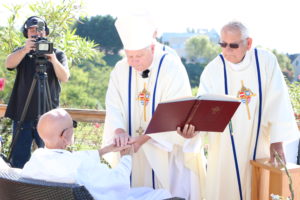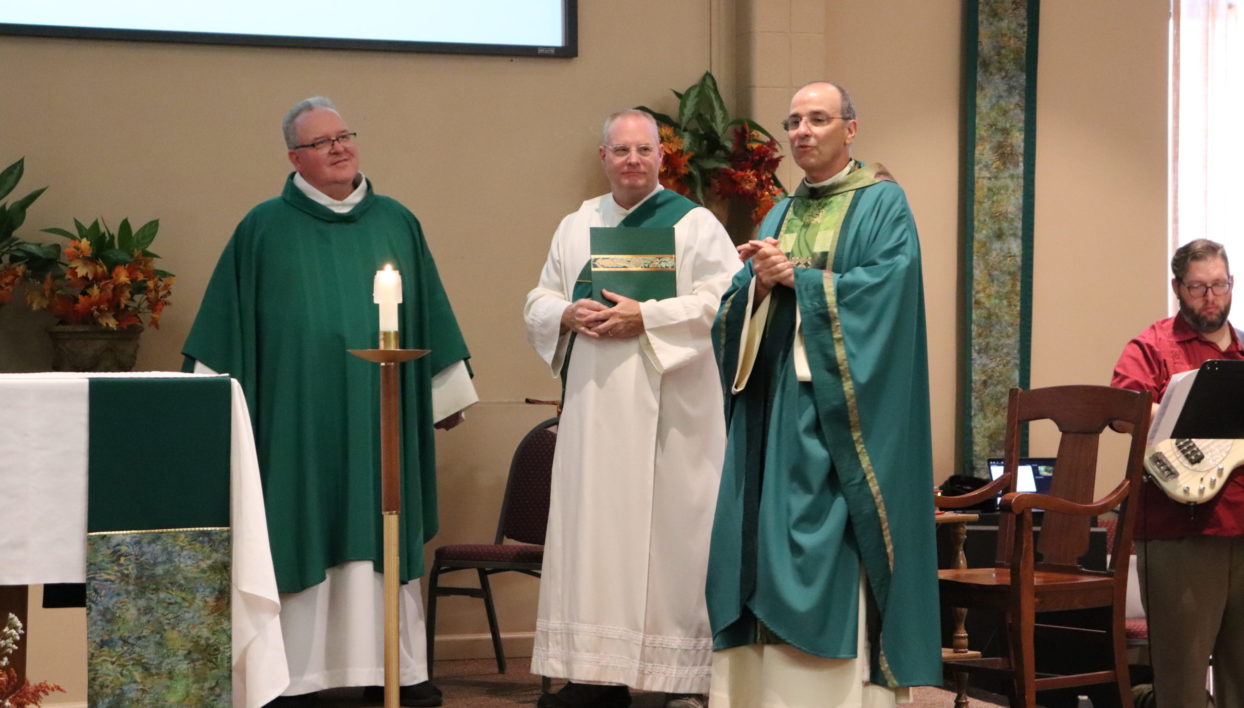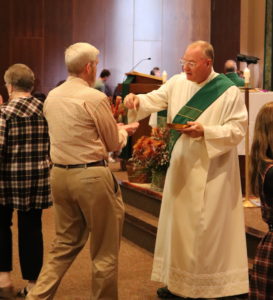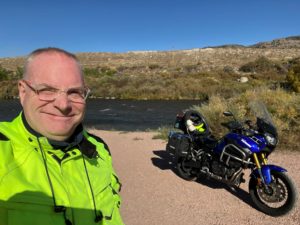Diocese of Knoxville’s Patrick Murphy-Racey becomes affiliate deacon for Paulist Fathers
By Gabrielle Nolan
Deacon Patrick Murphy-Racey would describe his work within the Church as “a very unique assignment.”
Ordained in 2007 with the Diocese of Knoxville’s first deacon class, Deacon Murphy-Racey is assigned to St. John XXIII Catholic Center and Immaculate Conception Parish, which are both staffed by the Paulist Fathers within the diocese.
And, more recently, the deacon has been trained to become a deacon affiliate with the Paulist Fathers.
“There’s only seven of us in the whole world,” Deacon Murphy-Racey said. “And I’m one of the few that actually gets to serve in a Paulist parish. Most of the guys are not in a Paulist parish, and so they have a little more difficult time doing what we do with the charisms of the Paulists. I’m very fortunate to be here.”
The formation to become a deacon affiliate involves six virtual formation sessions. Deacons review the life of Paulist founder Father Isaac Hecker; the general history and mission of the Paulist Society; a history of the Catholic people in the United States; and directions of evangelization and mission that are needed today.
“Being a Paulist deacon affiliate is a way for deacons to bring the values of Paulist mission into the various situations in which they minister,” said Father Frank DeSiano, who currently serves as president of Paulist Evangelization Ministries.
“Deacon affiliates are not formally members of the Paulist Society but rather ministers associated with the Paulist vision,” Father DeSiano continued.
“I am still and always will be a deacon of the Diocese of Knoxville,” Deacon Murphy-Racey explained, noting that Bishop Richard F. Stika gave his permission and blessing to move forward as a deacon affiliate.
Father DeSiano said that because incardination and membership are not involved, “there is no canonical procedure and no recourse to authorities in Rome.”
Deacon affiliates also take a promise each year to pray for the Paulists’ mission and aim to embody that mission within their own ministries.
“Deacons are free to not renew that promise in accord with the necessities of their life situations,” Father DeSiano said.
Father DeSiano mentioned that deacon affiliates do not receive assignments from the Paulist Society. Instead “they are invited to see opportunities in their ministry to reach out to people who are not active in their faith or people who do belong to a faith community. This happens in accord with the circumstances of the deacon and the inspiration of the Holy Spirit.”
Virtual meetings allow the seven deacon affiliates to stay in touch and discuss pastoral directions.
Deacon Murphy-Racey noted that this process to be an affiliate with the Paulists is “possible for any permanent deacon serving anywhere in the world.”
A Paulist culture
Deacon Murphy-Racey, a native of Chicago, is married with two adult children.
A third-generation graduate of Marquette University, the deacon pointed to the strong Jesuit ties within his family.
“Our family culture is very much Jesuit, and now Paulist,” he said.

Deacon Patrick Murphy-Racey, a professional photographer and videographer, captures video of Bishop Richard F. Stika ordaining Ken Conklin to the permanent diaconate on Sept. 25, 2021, during a special ordination Mass at Deacon Conklin’s home.
Deacon Murphy-Racey is a self-employed photographer who previously worked with Sony and as a Sports Illustrated photographer. Several times a year, he would travel to New York City for work.
“I was in Central Park a few years ago, and I was shooting something, and I posted a picture on Instagram and Father Eric [Andrews] saw it,” he explained.
The Paulist Father, who formerly served in Knoxville, invited Deacon Murphy-Racey to visit the motherhouse, St. Paul the Apostle Cathedral.
“We ended up going to dinner, and [Father] said to me, you know we have a big house here, and we have rooms for priests that visit or deacons. And if you ever come back to New York for work, you could stay with us,” Deacon Murphy-Racey recalled.
“And so what happened is I started to share meals with the elder Paulists who are retired, and… I met a bunch of seminarians, I met some of the older guys, I met some people that were in transition between assignments,” he continued.
Deacon Murphy-Racey began to spend his free time in New York with the Paulists.
“I just really started to get interested in who Isaac Hecker was and who the Paulists were, and so Father Eric gave me a book on the Paulist priests, and I read it,” he said. “I was really taken with Isaac Hecker.”
Father Hecker founded the Paulist Fathers order in 1858 in the Archdiocese of New York. His cause for sainthood was opened on Jan. 25, 2008, and he is now considered a Servant of God in the Catholic Church.
Deacon Murphy-Racey also identified with the ecumenical nature of the Paulists’ work, which coincides with his work as a Knox County law enforcement chaplain.
“People will say, ‘What are you? Where do you go to church?’ And I say I’m Catholic, and they’re usually shocked. They’re like ‘I’ve never met a Catholic before,’” Deacon Murphy-Racey said. “In East Tennessee, it’s so important for Catholics to basically show themselves in a positive light by caring for others.”
For the Paulists and Deacon Murphy-Racey, they have the opportunity to show that positive light through their ministries.
“We’re not afraid of people of other faiths; in fact, we want to go, and we want to be in dialogue with you and learn from you, and hopefully you learn from us, too,” he said.
Celebrating vocations
The U.S. Catholic Church celebrated National Vocation Awareness Week Nov. 6-12. Across the country, dioceses, parishes, and Catholic organizations hosted events to promote vocations to the ordained ministry and consecrated life. The faithful were encouraged during that week to renew their prayerful support for those currently discerning a vocation to the priesthood, diaconate, or consecrated life.
In his “Message for the World Day of Prayer for Vocations,” Pope Francis reiterated his call for the Church to become increasingly synodal and compared the diversity of vocations in the Church to that of a beautiful mosaic.
“As Christians, we do not only receive a vocation individually; we are also called together. We are like the tiles of a mosaic. Each is lovely by itself, but only when they are put together do they form a picture. Each of us shines like a star in the heart of God and in the firmament of the universe. At the same time, though, we are called to form constellations that can guide and light up the path of humanity, beginning with the places in which we live. This is the mystery of the Church: a celebration of differences, a sign, and instrument of all that humanity is called to be,” the Holy Father said.
Bishop James F. Checchio of Metuchen, N.J., who is chairman of the U.S. Conference of Catholic Bishops’ Committee on Clergy, Consecrated Life, and Vocations, emphasized that vocational discernment always takes place within a community.
“Each year, the CCLV Committee commissions the Center for Applied Research in the Apostolate to conduct surveys of those recently ordained and religiously professed in the past year. These studies consistently show that vocations are the fruit of communal accompaniment. The family, healthy and holy friendships, youth group, campus ministry, and the broader parish and diocesan community form supportive environments in which vocations are first nurtured and grown,” Bishop Checchio said.
Observance of Vocation Awareness Week began in 1976 when the U.S. bishops designated the 28th Sunday of the year to call attention to the importance of upholding vocations and praying for those discerning a religious vocation and celebrating those who were in ordained ministry and consecrated life.
In 1997, the celebration was moved to the Feast of the Baptism of the Lord, and in 2014, the Committee on Clergy, Consecrated Life, and Vocations moved the observance of National Vocation Awareness Week to November to influence youth and young adults by engaging Catholic schools and colleges.
Catholic News Service contributed to this report.



